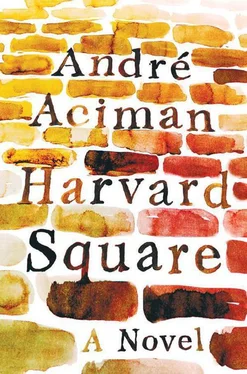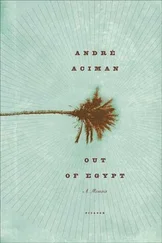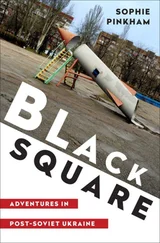An hour or two later, Kalaj walked into the café bearing a large teacher’s edition of Parlons! with accompanying teacher’s manual, exercise book, reader, and lab book.
“Tomorrow at eight o’clock, Lamont 310.”
He looked at me more puzzled than ever. What was Lamont? The name of a building, I explained. He had never heard of it. Corner of Quincy Street and Mass Ave. He knew exactly what I meant. I explained to him that there was a periodical room in Lamont. After teaching, he could read all the French newspapers and periodicals he pleased without having to pay a cent. He liked the idea of reading newspapers and periodicals after teaching.
Where was he going to hold his office hours?
He thought about it.
“Here,” he said. “This way they’ll get a taste of French cafés.”
He said that Cherbakoff had mentioned something about an ID card, but Kalaj figured it would take too much time. He’d simply borrow mine when he needed it. It was useless arguing how this would have complicated matters for the two of us. I let him borrow mine. He said he had to prepare for his class tomorrow morning.
Had they suggested how they wanted him to teach French?
“I told them I already knew,” he replied.
This was not boding well at all. Suddenly I imagined a small village school outside Tunis where a local teacher, brandishing a long stick, walked around a classroom filled with cowering frock-clad boys. When one of them hesitated with the answer, whack!
“You can’t yell,” I said. “And you can’t hit anyone.”
He thought for a while.
“How am I going to teach them anything then?”
“You can’t yell, you can’t strike, you can’t even make them feel bad about themselves.”
“So, if someone is an absolute idiot, what do I tell him — that he’s a prodigy?”
Zeinab, who had overheard the conversation, started laughing at Kalaj when she realized that his teaching at Harvard was not a joke. “How can he teach them anything when he doesn’t understand the agreement of the past participle with the direct object?”
“I understand it well enough.”
“Prove it.”
“It would take too long and I don’t have the time.”
“Prove it.”
“I don’t want to.”
“Because you don’t know.”
“What I know is that you’d do anything to go to bed with me — but it won’t work.”
Near us a couple was just about to leave. They hadn’t touched the huge wedge of Brie they had ordered.
The young man stood up and went to pay. The girl was already waiting for him outside the doorway.
Kalaj grabbed the piece of cheese and spread it richly on a slice of baguette, which he then cut neatly in two, one half for me, the other for himself. Zeinab cast an angry look at him.
“They throw away everything in this country. I, I, I, Kalaj, am not ersatz. And I’m not a thief. Food is food, and this one has already been paid for.”
“If you wanted food, Kalaj, all you had to do was ask me,” said Zeinab, who would have cut off her right hand and given it to him had he just stared at it long enough.
“You won’t even tell me how the past participle agrees with the direct object, and now you want to feed me?”
“I told you: I’ll do everything for you.”
“Back to that again! Just leave me alone. I need to study what I have to teach these ersatz minds.”
“Just mind your past participle. I’ll explain it if you could only learn to listen,” said Zeinab.
“Explain. But be brief.”
I left them, went home, and changed into better clothes. I had to be on Chestnut Hill for cocktails at Allison’s parents. I had originally thought of asking Kalaj to drive me there, but then remembered he’d had his license revoked. Besides, arriving by cab all the way from Cambridge would send the wrong message. Now, without his license, the question was moot. I was going to take the train. “Try to find me a job with all those rich contacts of yours,” he had said. “I’ll be their driver, cook, bodyguard, pimp. Anything.”
All I kept thinking for the remainder of the evening was: Now he has complete access to my apartment, has my ID card, and even teaches where I teach. I’d never felt so invaded or taken over before. I hated the feeling. It was as if my double were squeezing me out. Why had I been so weak? And why was I thinking like a tightfisted, skinflint Jew? The Jew who likes his little things in their little place, who wants what people borrow instantly returned, who doesn’t open his doors too wide for fear strangers might storm in and never leave, the Jew who doesn’t want others to open their heart, fearing he might have to open his, who won’t venture in though God knows he’s been invited in so many tacit ways. Or had I become an American now: my space, your space, and lots of spaces in between?
I hated myself both for not wanting to let him into my apartment and for surrendering without a struggle — for not refusing to go to the cocktail party at Allison’s parents, and for taking the long train ride to get there, for saying I wasn’t sure I would go and for begrudging having to go, for not wanting to marry Allison and for letting her think I wanted nothing more, for not wanting to be a student of literature, for not wanting to be in Cambridge, or in the United States, all the while continuing in a rut that felt, and indeed was from the very start, the best that life had to offer.
As I watched my own reflection on the glass panels of the Green Line car heading out to Newton that evening, I kept asking myself: Was this really me, and were these really my features standing out on this totally alien Boston scenery? Who was I? How many masks could I be wearing at the same time? Who was I when I wasn’t looking? Was I simply a being without shape, ready to be molded into what everyone wanted me to be? Or by acquiescing so easily was I simply making up in advance for the treachery I invariably brought to those who trusted the face?
I looked at my face against this strange Boston background and saw a lawyer who overtips the waiter at lunch because he knows he’ll be vicious in court that afternoon. I saw a husband who buys his wife expensive jewelry — not after cheating on her, but before finding the person who’ll help destroy his marriage. I saw a priest who absolves everyone because he has lost his faith and no longer trusts in his vocation.
That evening, Allison wanted to drive me back home. I let her, though I would have preferred the train. There was a moment at the party when I wished to undo my tie if only to let fresh air into my system, but also to show I had less in common with the guests than with the waiters, who were all wearing open-collar, buttoned-down white dress shirts. Suddenly, I wanted to be alone and watch Kalaj roll a cigarette as he made fun of this entire party with its jumbo gravity hanging from its jumbo chandeliers, the jumbo levity of the frou-froued guests who kissy-kissed and huggy-hugged with their jumbo show of plenitude and ease. Amerloques, I could hear him say. “Take this one,” he’d point to a woman in the crowd. “Skin like burlap. Three generations ago she was scrounging turnips out of the dead land. And as for these two,” he’d snicker, “they may have come on board a sailboat, but look under, and you’ll find the coarseness of a sea dog and the larceny of stevedores.”
I wanted to sit by myself in the empty train car and let the hypnotic rhythm of the wheels dull the fire within me. All these wealthy people who simply belonged. Their large cars. Their large mansions. Their startled large eyes when they repeated my name. Their professed love for the Mediterranean which they couldn’t, if you gave them ten lifetimes, begin to understand, because what they always liked instead was the cold Atlantic and the limitless Pacific, because Kalaj was right, this was another world, and this was another tongue, and these people were a different order of beings, just as their women were women plus something, or maybe minus something that made them different from the women we’d known and been raised by and been taught to worship, because, among so many things, they were everything that a man was not and could never be. Kalaj would understand. And yet now, strangely enough, I didn’t want to have anything to do with him either, because I was ashamed of him, because I was tired of him, because however much I was closer to him than to any of these people at this party, the distance between him and me was big enough to remind me, even when I missed him, that estrangement was carved into me with acid and barbed wire. I was no closer to him than I was to them.
Читать дальше












